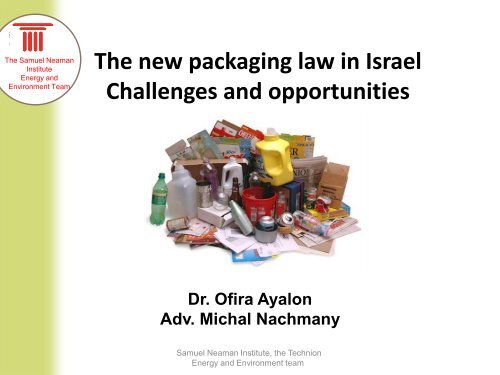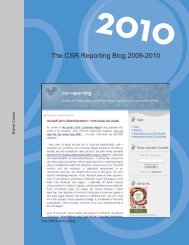ש×××ש ×ת×ר×צ×× ××××××× ×× ×××× ×¤×¡××ת ×¢×ר×× ×ת ×××¦×§× ××שר××
ש×××ש ×ת×ר×צ×× ××××××× ×× ×××× ×¤×¡××ת ×¢×ר×× ×ת ×××¦×§× ××שר××
ש×××ש ×ת×ר×צ×× ××××××× ×× ×××× ×¤×¡××ת ×¢×ר×× ×ת ×××¦×§× ××שר××
You also want an ePaper? Increase the reach of your titles
YUMPU automatically turns print PDFs into web optimized ePapers that Google loves.
The Samuel Neaman<br />
Institute<br />
Energy and<br />
Environment Team<br />
The new packaging law in Israel<br />
Challenges and opportunities<br />
Dr. Ofira Ayalon<br />
Adv. Michal Nachmany<br />
Samuel Neaman Institute, the Technion<br />
Energy and Environment team
Israeli MSW treatment milestones<br />
• 1993 – Government Decision – regulating MSW landfilling, recycling<br />
regulations<br />
• 1998 – Approval of recycling obligation regulations - government<br />
subsidy of the difference between dumping costs and transport &<br />
landfill costs)<br />
• 2007 - Recycling target is 25% of MSW<br />
• 1999 – Hiria dump site shut down<br />
• 2001 – Deposit scheme for drinking bottles and cans<br />
• 2003 – last unregulated dump in Israel shut down<br />
• 2006 – publication of national MSW management plan<br />
• 2007 – Establishment of landfill tax<br />
• 2010 – 1 st legislative phase of packaging law (polluter pays)<br />
Samuel Neaman Institute, the Technion<br />
Energy and Environment team
2010<br />
• All unregulated sites shut down<br />
• Only new or upgraded sites built<br />
• Over 80% of waste directed to regulated sites, ‘pirate’<br />
dumping declined greatly<br />
• Recycling rate – 20% (including organic material)<br />
• 250 Mil. NIS (~55 Million Euro) in a designated fund<br />
• Appropriate & wise use of funds must be guaranteed<br />
Samuel Neaman Institute, the Technion<br />
Energy and Environment team
Composition of MSW and of<br />
Packaging waste<br />
Composition of municipal solid<br />
waste, 2005, average weight<br />
Packaging waste composition,<br />
2010, thousand ton/year *<br />
*Packaging waste estimated at 1.1 mt/year, approx. 20% of Solid waste
Packaging Law –<br />
Stakeholder participation<br />
• Government<br />
• Industry<br />
• Local authorities<br />
• Antitrust authority<br />
• NGOs<br />
Samuel Neaman Institute, the Technion<br />
Energy and Environment team
Packaging law Principles<br />
(in preparation)<br />
• Based on the European Packaging directive<br />
• Key principles –<br />
– Source separation (2 streams at least)<br />
– Producer responsibility<br />
– Joint mechanism (similar to Nedvang)<br />
Samuel Neaman Institute, the Technion<br />
Energy and Environment team
WET/DRY separation<br />
• Declared policy of the Ministry for<br />
Environmental Protection<br />
• Wet Stream<br />
– Compostation<br />
– anaerobic digestion<br />
• Dry Stream (1/3 packaging)<br />
– recycling<br />
– Energy Recovery<br />
Samuel Neaman Institute, the Technion<br />
Energy and Environment team
Opportunities & Challenges<br />
• Producer responsibility<br />
• Improving municipal waste collection<br />
schemes (~20% financing by manufacturers)<br />
• Business opportunities for developing Israeli<br />
recycling industry<br />
Samuel Neaman Institute, the Technion<br />
Energy and Environment team
Complimentary Measures to<br />
packaging waste regulation<br />
• Landfilling tax(currently ~8 Euro/ton, about to be<br />
raised to ~26 Euro/ton)<br />
• Limiting organic matter landfilling (similar to<br />
European policy)<br />
• Incentives for source reduction – e.g. PAYT<br />
• Developing end-solutions for recycling and<br />
recovery (financed by designated ‘waste’fund)<br />
• Developing markets for recycled materials<br />
Samuel Neaman Institute, the Technion<br />
Energy and Environment team
Samuel Neaman Institute, the Technion<br />
Energy and Environment team




